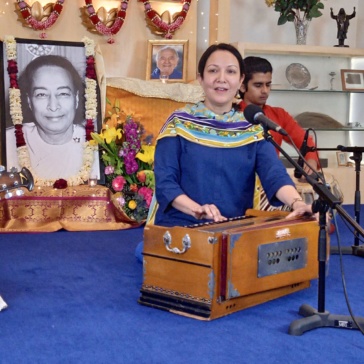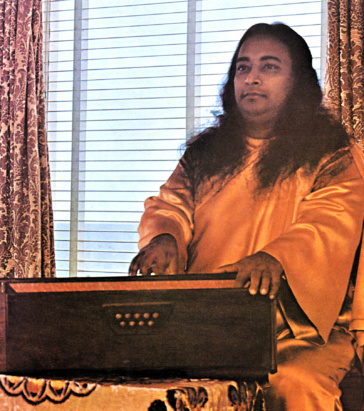Devotion is one of the prerequisites on the spiritual path. We all need it. But how do we develop it? Yogananda said “Chanting is half the battle” because it’s a great tool to not only develop devotion but also to bring our minds to a focus before we begin our meditation practice. Love is the best catalyst for success in meditation and life. And chanting is the best way to develop that love for God. Learn how chanting can help you develop that love in this article.
“Neither a lofty degree of intelligence nor imagination nor both together go to the making of genius. Love, love, love, that is the soul of genius.”
- Mozart
When I started meditating a little more than 2 years ago, YouTube was my only guide. Most videos told me meditation is about choosing an anchor for the mind - say, the breath - and focusing on it for ever-increasing amounts of time.
Like many aspiring meditators, this method seemed arduous and dry. Still, to not weaken my will, I followed the definition of the letter. But there was one problem. It wasn’t getting me anywhere.
I googled all possible solutions to fix my ‘problem’. I worked on my posture, did yoga asanas, experimented with various kinds of cushions, changed the direction of my body, etc. But when I truly discovered what meditation is, I realized the key components I’d been missing - love!
Love is behind all achievement. Even in worldly conquests, what separates the successful from the mediocre is devotion and hunger towards the goal. It’s no surprise then, that the people who make the most money are also the ones who love it the most!
In that sense, love is the greatest catalyst. Love is literally blind. For when one loves something, they don’t see anything besides their object of love. Love fuels our determination and willpower.
The only difference between devotees and the material man is the object of his love. One loves God and the other loves people, success, fame, power, pride, money, etc.
Yogananda defined meditation as: “concentration only to know God.” But what’s concentration without love?
If I tell a teenage boy to concentrate on a dirty pig playing in the mud, his mind will find every excuse to wander. But if I tell him to focus on a girl he likes - he could probably stare at her for hours!
The same is true for our meditations. Without the power of love, our concentration lacks vigour and vitality. This is also why many people who make mindfulness mechanistic don’t find it fruitful.
But when love for God pours out of your heart, how easy is it to concentrate! Consider the powerful words of Yogananda,
“You have to make God break His vow of silence; then He will speak. That is what makes it difficult to know Him. It requires devotional perseverance. How many years I secretly cried for God!”
He goes on to add a crucial piece of advice for all spiritual aspirants:
“You must sit and pray and cry and churn the ether with your yearning until all space is aflame with your devotion. Until you don’t know time at all. Those who pray with watch-consciousness never get anything. That is why I follow no routine. I go by my Spirit within.
God must come first. No matter what comes, it must be secondary. God first! The wise ones say, ‘Thou art more tempting than temptation.’ What joy, what Love He brings! Every second of your life is a romance with God. Ecstasy after ecstasy.”
When I first read these words, I couldn’t help but think that this level of devotion is out of my spiritual ‘paygrade’ so to say. Soon I realized, however, that the question is not how far we’re from the ideal but what are we doing to get there?
The Power of Chanting
Chants can be understood as prayers put to music. And there’s a good reason for doing so — music bypasses your intellect and goes directly to your heart. Words often go through your intellect where you can accept or reject them. But music has the power to change your consciousness in an instant.
 Chanting is definitely not the only way to express your devotion, but it’s the best one there is.
Chanting is definitely not the only way to express your devotion, but it’s the best one there is.
Being born and brought up in India, chanting comes naturally to me. The sounds of chants I heard as a kid still rings in my ears. In fact, my mother plays them on the speakers every morning!
On the other hand, the West is characterized by its intellect and willpower. This is one of the reasons why the concept of chanting is not as prevalent.
But no matter which group you belong to, there’s good news! Chanting can change you for the better — it can light the fire of love in your heart.
How? Because thoughts lead to the right actions and the right action leads to the right thoughts. Once you start changing, even if you feel nothing at first, the mere practice will instil the desired qualities in you — of which most important is love.
Over a period of a few months, as you chant regularly, you’ll find your heart filled with love. And that love will help you go deeper in meditation the way you never experienced before.
On days when I don’t feel inwardly inspired for deep, dynamic meditation, I try to pour my heart into chanting and it works! It re-awakens your love for God, which as I said, helps you concentrate on Him throughout your meditation. What more can you ask?
How to Do it
Chanting is both an art and science. The artistic aspect of it is the heart’s love. No one can teach you that — it’s for you to develop (don’t worry, that’s why we’re chanting in the first place).
Scientifically speaking, chanting captures the monkey mind and stops the chatter. There are a few stages of chanting that gradually help to calm the mind and take the feeling of the chant deeper:
1) Loud Chanting:: The primary purpose of loud chanting is to capture the conscious mind. In the midst of activity, when we try to meditate, it can be difficult to withdraw our attention from everything that’s happening in our lives. Chanting loudly helps to command attention from our minds.
2) Soft Chanting:: Once you feel focused on the chant and your concentration deepens, chant in a soft voice. Feel the words of the chant in your heart and lift it to the spiritual eye.
3) Whispered Chanting: The goal of chanting in a whisper is to bring the chant deeper into the subconscious mind. This also helps to ingrain the chant deep in your mind so it remains there even behind all your actions throughout the day.
4) Mental Chanting: Being the highest level of chanting, the goal here is to chant only mentally gazing up at the spiritual eye. The spiritual eye is the broadcasting station of your body. You progress spiritually the more your consciousness flows to this point.
At this point, you should be significantly withdrawn and feeling inward. This is the perfect time to go into meditation and carry the love for as long as possible.
What Words Can You Use?
Paramahansa Yogananda often chanted his Cosmic Chants and his devotees too often choose from the wide array of those chants. There’s a deep reason behind this.
Any chant that helps you receive a divine response is spiritualized. In other words, it carries the spiritual vibrations that can uplift your consciousness in an instant every time you sing it.
Similarly, Yogananda often chanted these chants till he was in God-communion himself. This is why they’re permeated with strong divine vibrations. (Listen to one of those chants and you’ll see it for yourself!).
He says,
“One who repeats these Spiritualized Songs or Cosmic Chants with ever-increasing devotion will find a more direct way to contact God than by the repetition of songs which are the outcome of blind sentiment and not of God-communion. These chants properly repeated will bring God-communion and ecstatic joy, and through these the healing of body, mind and soul.”
Being born in India, I’ve been hearing various chants in Sanskrit or Hindi that have been given by saints and sages of all religions. These chants too are beneficial for our progress since they come from enlightened masters.
A chant doesn’t have to be an elaborate phrase that’s difficult to remember. You can simply take the Lord’s name in whatever form you prefer — “God,” “Christ,” “Rama,” “Krishna,” etc.
The important thing is that your heart should sing along. Even a single word like “Aum” can be highly powerful when infused with love and devotion.
Final Thoughts
“Even Kings and emperors with heaps of wealth and vast dominion cannot compare with an ant filled with the love of God.”
― Guru Nanak
Love is the best catalyst for success in meditation and life. And chanting is the best way to develop that love for God.
One of the main reasons chanting works so well is it captures the conscious mind in a matter of seconds.
If your mind is going nuts, it’s difficult to sit for meditation and concentrate on anything. But with the help of chanting, you can prepare your mind (and your heart) by sowing the seed of love.
After all, this is why we listen to music right? No matter how stressed we are, our favourite songs tend to always uplift us. It’s as if they teleport us to a new place where we can let our worries go.
If we take life too seriously, we’re not able to attune ourselves to our higher Self. By chanting, you can attune to the Cosmic Vibration that is omnipresent — you’re essentially communing with God as sound!
 All I can say is it has a deep effect on your mind, body, and soul — deeper than we can often perceive. An example of this is the miraculous healings that took place when Yogananda chanted “O God Beautiful” with thousands of others at Carnegie Hall in 1926. The next day many men and women testified to the God-perception and how certain ailments were healed completely.
All I can say is it has a deep effect on your mind, body, and soul — deeper than we can often perceive. An example of this is the miraculous healings that took place when Yogananda chanted “O God Beautiful” with thousands of others at Carnegie Hall in 1926. The next day many men and women testified to the God-perception and how certain ailments were healed completely.
As you chant more, bring the chant into your daily life as well – a practice known as Japa. Japa helps to keep your consciousness uplifted throughout the day. I’ve found that even mundane tasks become joyful if you chant the name of God or one of Yogananda’s/Swami Kriyananda’s chants.
Try your hand at chanting if you’ve never done it before. Start by listening to a chant and sing along. Then, learn an instrument or two if you feel like it — when you chant yourself you’ll find the benefits multiply like a forest fire.
Finally, let me end with a prayer by St. John of the Cross,
“Well and good if all things change, O Lord God, provided I am rooted in You.”
Related Video

One Comment
Very nice shivendra. Well articulated with right words & Bhav. Master bless you.